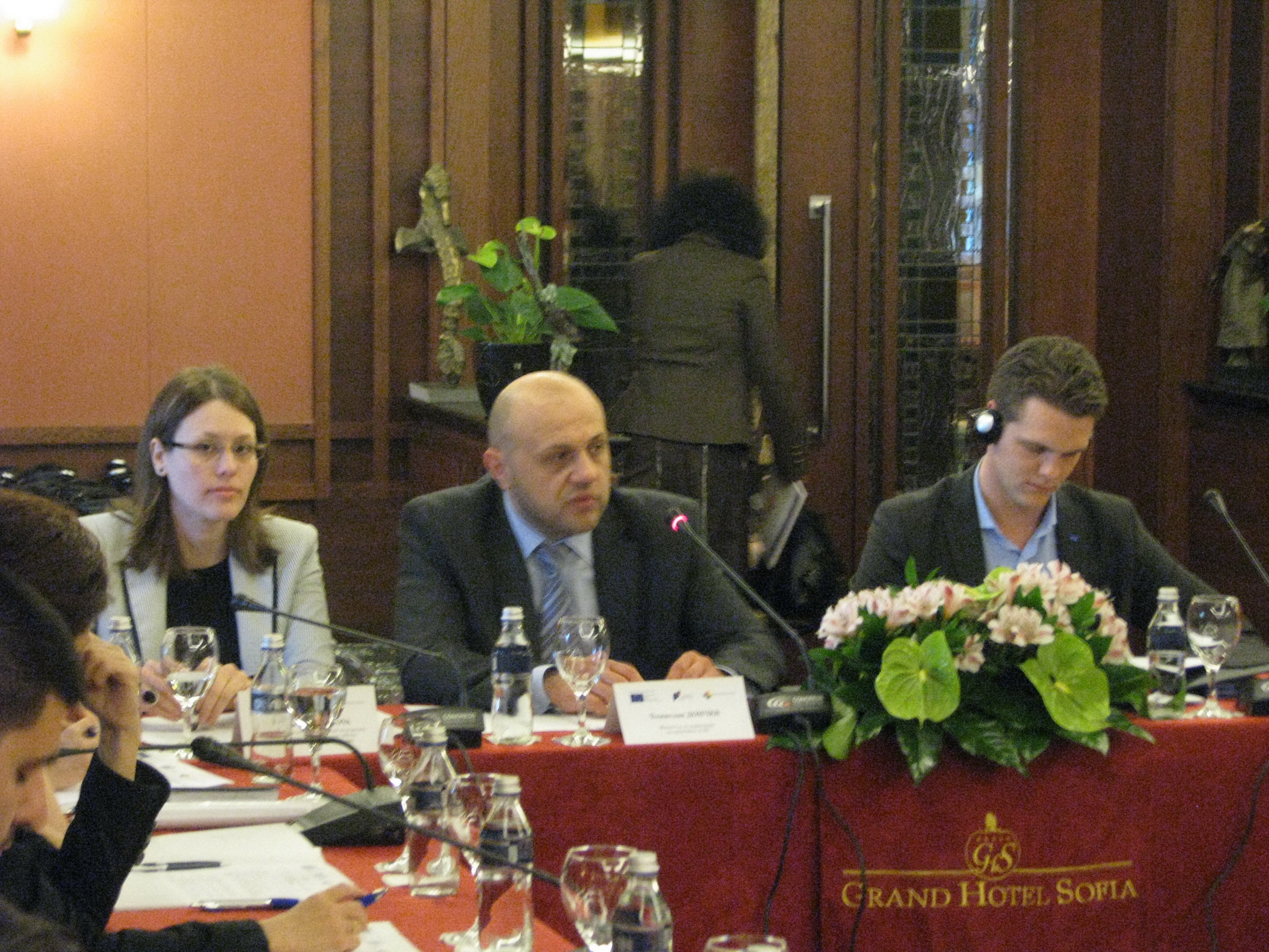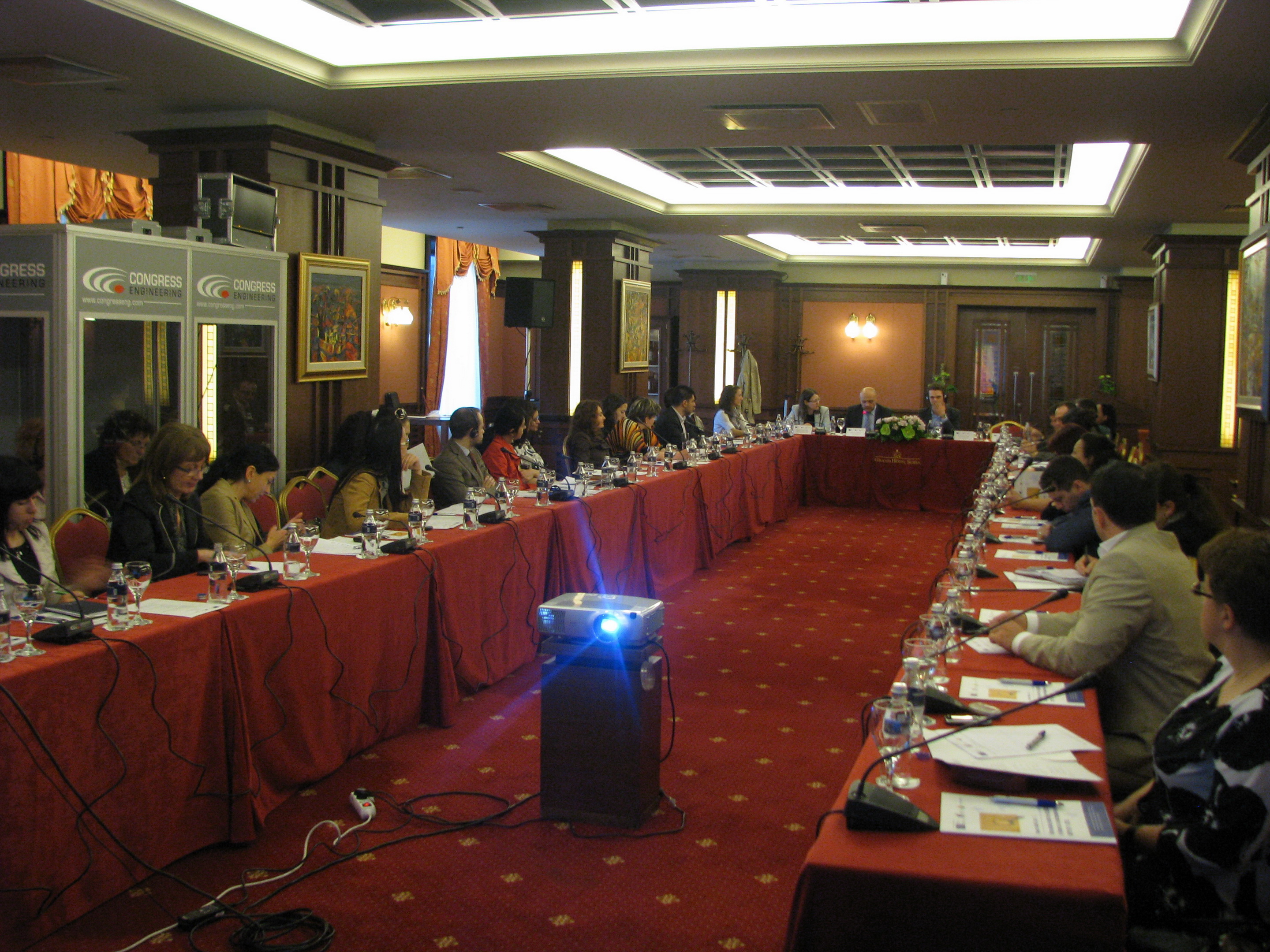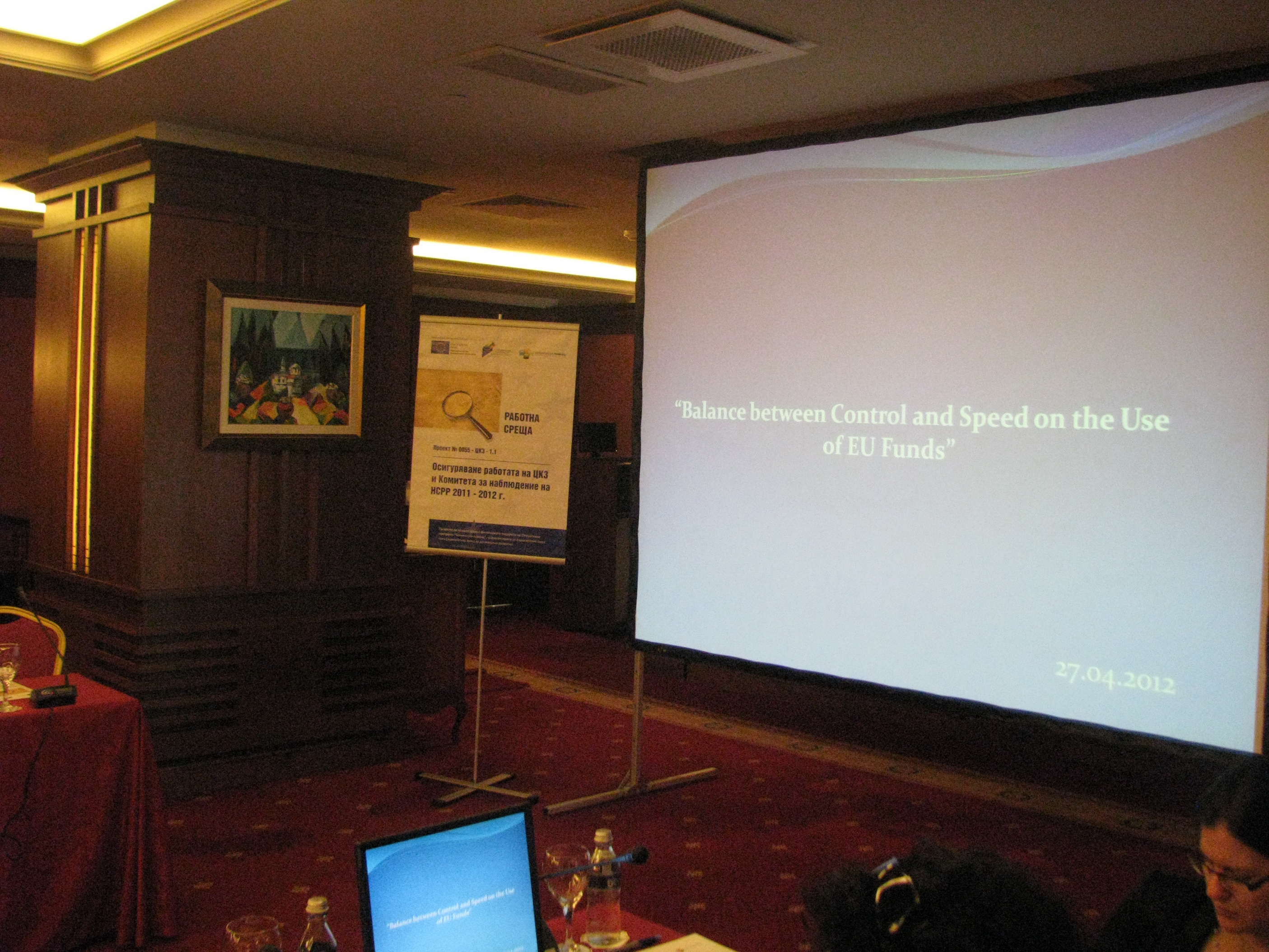Parliamentary Committees
Committee on European Affairs and Oversight of the European Funds
Monika Panayotova took part in a conference: Balance between Control and Speed on the Use of EU Funds
27/04/2012
On April 27, 2012, under the patronage of the Minister in charge of EU Funds management - Mr. Tomislav Donchev, a conference on "Balance between Control and Speed on the Use of EU Funds", was held in Sofia. Special guest of the conference was Christopher Fjellner, MEP from the group of the European People's Party, substitute in the Committee on Budgetary Control (CONT) to the European Parliament and Rapporteur for the Commission discharge for the financial year 2010.
Mr. Fjellner pointed out that as a result of the EU budget shared management, almost 80 % of the European money is spent by the Member States. The areas, subject to a great amount of EU financial allocations – Cohesion Policy and CAP – are the ones most prompt to mistakes. Mr. Fjellner added that unlike general expectation for Bulgaria, Rumania and Greece to realize the highest level of error rates, in fact 60 % of the errors occurred in the Cohesion Fund management are caused by the Member States with the longest experience in EU Funds management (since the ‘70s) – Italy, Spain and UK.
Participants in the discussion were the Chairwoman of CEAOEF - Monika Panayotova, Iliana Ivanova, MEP and Vice-Chair of the Budgetary Control Committee in the European Parliament, Dobrinka Mihailova, Director of "Audit of EU Funds" Directorate at the Ministry of Finance, Karina Karaivanova, Director of "National Fund" Directorate at the Ministry of Finance, George Zaikov, Head of "Reporting irregularities" Sector to the "Coordination of fight against infringements affecting the financial interests of the EU (AFCOS)” Directorate in Ministry of Internal Affairs, as well as representatives of the Operation Programmes’ (OP) Managing Authorities (MA).
Ms. Panayotova focused her contribution on three key issues: absorption speed related to the measures undertaken by the MAs in order to accelerate the OP’s implementation, CEAOEF parliamentary control and lessons learned from the current programming period. She noted that the balance between speed and control of the absorption requires reasonable application of the principle of proportionality - focusing efforts on reducing the administrative burden and streamline the procedures, without underestimating the existing rules.
In line with CEAOEF recommendations to the executive power, addressed during the regular hearings on the progress achieved by the individual OPs, Ms. Panayotova emphasized on the following measures, taken to accelerate OPs implementation:
- the use of electronic application and delivery of e-services to beneficiaries;
- introduction of standard document templates;
- further optimization of procedures related to project implementation and reporting in order to alleviate the administrative and financial burden on beneficiaries, as well as changes in some major laws (such as Public Procurement Law, Spatial Development Act, Public-Private Partnership Law);
- overcoming the shortage of beneficiaries’ funds (municipalities and companies) to ensure own project financing - by expanding the scope and application of the financial engineering instruments;
- direct contact with beneficiaries in support of quality preparation and implementation of projects, incl. through the initiative to have an "open doors" day, introduced by the MAs.
Mrs. Panayotova noted that a specific aspect of the Bulgarian system of management and control of EU funds is the involvement of the national parliament in the process of carrying out an independent monitoring. Within the last parliamentary term, this control has been exercised by a special subcommittee to the European Affairs Committee, while in 2009 the Committee on European Affairs and Oversight of the European Funds was established. This attests to the specific importance which Bulgaria renders to the effective implementation of EU Cohesion Policy in the country. Moreover - parliamentary oversightl is an integral part of the broader civil control over policies.
Mrs. Panayotova outlined the five important lessons-learned from the implementation of EU funded programmes in the current programming period, which can serve as good practices for the countries of Southeastern Europe:
1. Formation early in the programming period of a clear vision and a small number of specific priorities and applying an integrated approach;
2. Building of sustainable management and control systems to ensure "internal" immunity and timely response in case of irregularities in the management process. Building such a capacity is also a guarantee for a low level of errors;
3. Optimization of procedures – e-governance, less bureaucracy, constant strengthening the capacity of the administration and beneficiaries;
4. High degree of project readiness, particularly in sectors related to environmental, transport and energy infrastructure;
5. Trust and continuous dialogue with all stakeholders at national and European level, as a guarantee for providing more transparency and accountability regarding the spending of EU funds.
For more information on the conference, please visit: http://www.eufunds.bg/bg/pubs/1744
Mr. Fjellner pointed out that as a result of the EU budget shared management, almost 80 % of the European money is spent by the Member States. The areas, subject to a great amount of EU financial allocations – Cohesion Policy and CAP – are the ones most prompt to mistakes. Mr. Fjellner added that unlike general expectation for Bulgaria, Rumania and Greece to realize the highest level of error rates, in fact 60 % of the errors occurred in the Cohesion Fund management are caused by the Member States with the longest experience in EU Funds management (since the ‘70s) – Italy, Spain and UK.
Participants in the discussion were the Chairwoman of CEAOEF - Monika Panayotova, Iliana Ivanova, MEP and Vice-Chair of the Budgetary Control Committee in the European Parliament, Dobrinka Mihailova, Director of "Audit of EU Funds" Directorate at the Ministry of Finance, Karina Karaivanova, Director of "National Fund" Directorate at the Ministry of Finance, George Zaikov, Head of "Reporting irregularities" Sector to the "Coordination of fight against infringements affecting the financial interests of the EU (AFCOS)” Directorate in Ministry of Internal Affairs, as well as representatives of the Operation Programmes’ (OP) Managing Authorities (MA).
Ms. Panayotova focused her contribution on three key issues: absorption speed related to the measures undertaken by the MAs in order to accelerate the OP’s implementation, CEAOEF parliamentary control and lessons learned from the current programming period. She noted that the balance between speed and control of the absorption requires reasonable application of the principle of proportionality - focusing efforts on reducing the administrative burden and streamline the procedures, without underestimating the existing rules.
In line with CEAOEF recommendations to the executive power, addressed during the regular hearings on the progress achieved by the individual OPs, Ms. Panayotova emphasized on the following measures, taken to accelerate OPs implementation:
- the use of electronic application and delivery of e-services to beneficiaries;
- introduction of standard document templates;
- further optimization of procedures related to project implementation and reporting in order to alleviate the administrative and financial burden on beneficiaries, as well as changes in some major laws (such as Public Procurement Law, Spatial Development Act, Public-Private Partnership Law);
- overcoming the shortage of beneficiaries’ funds (municipalities and companies) to ensure own project financing - by expanding the scope and application of the financial engineering instruments;
- direct contact with beneficiaries in support of quality preparation and implementation of projects, incl. through the initiative to have an "open doors" day, introduced by the MAs.
Mrs. Panayotova noted that a specific aspect of the Bulgarian system of management and control of EU funds is the involvement of the national parliament in the process of carrying out an independent monitoring. Within the last parliamentary term, this control has been exercised by a special subcommittee to the European Affairs Committee, while in 2009 the Committee on European Affairs and Oversight of the European Funds was established. This attests to the specific importance which Bulgaria renders to the effective implementation of EU Cohesion Policy in the country. Moreover - parliamentary oversightl is an integral part of the broader civil control over policies.
Mrs. Panayotova outlined the five important lessons-learned from the implementation of EU funded programmes in the current programming period, which can serve as good practices for the countries of Southeastern Europe:
1. Formation early in the programming period of a clear vision and a small number of specific priorities and applying an integrated approach;
2. Building of sustainable management and control systems to ensure "internal" immunity and timely response in case of irregularities in the management process. Building such a capacity is also a guarantee for a low level of errors;
3. Optimization of procedures – e-governance, less bureaucracy, constant strengthening the capacity of the administration and beneficiaries;
4. High degree of project readiness, particularly in sectors related to environmental, transport and energy infrastructure;
5. Trust and continuous dialogue with all stakeholders at national and European level, as a guarantee for providing more transparency and accountability regarding the spending of EU funds.
For more information on the conference, please visit: http://www.eufunds.bg/bg/pubs/1744
 Български
Български English
English



